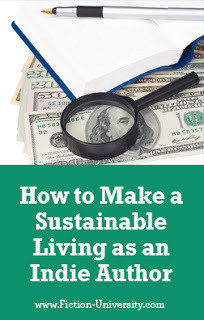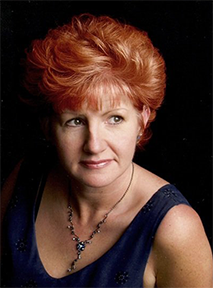Janice Hardy's Blog, page 112
March 20, 2018
What The Well-Dressed Villain Is Wearing These Days
 By Bonnie Randall
By Bonnie Randall Part of the How They Do It Series (Monthly Contributor)
I admit I am bad at this. I have a terrible tendency to craft stock, cardboard bad guys—one of the things I am most critical of in my own writing. So it is in the spirit of the old adage ‘those who can’t do, teach’ that I am sharing the following traits which, as an observer, I’ve found to be the most authentic ‘clothing’ a villain can wear:
1. A Flawless Face
At first blush this one will seem like a cliché—the gorgeous villain—but bear with me through a little psychology behind it. Many villains have narcissistic natures; self-absorbed, grandiose, prideful and propelled by an astonishing level of arrogance. So egocentric that they are devoid of the capacity for empathy and compassion that would otherwise make them fully human.
Read more »Written by Janice Hardy. Fiction-University.com

Published on March 20, 2018 03:00
March 19, 2018
How to Write When the Last Thing You Want to Do is Write
 By Janice Hardy, @Janice_Hardy
By Janice Hardy, @Janice_Hardy Writing is an activity that requires of a lot of brainpower. We tap into our intellect, or emotions, or sense of empathy, and draw from within to create a story. When life throws us a curve and sends all our brainpower in one “this sucks” direction, writing screeches to a halt.
Last week was a bad week for me. It started out great with the last days of a fantastic conference in Alabama, seeing old friends and making some new ones, then a lot of bad news crashed down on me at once. Just trying to write a post for today was difficult, and I stared at my list of topic ideas knowing I wasn’t going to be able to write a single one.
Hence, this post.
Life gets hard for lots of folks every day, and there’s a good chance many of you are having a rough time right now, too. I’m on deadlines, I have things I need to do, so curling into a ball and ignoring the world for a week or two isn’t an option. It’s even less of an option for writers with kids and jobs and many more obligations than I have.
Read more »Written by Janice Hardy. Fiction-University.com

Published on March 19, 2018 03:00
March 18, 2018
Writing Prompt: The Story Starter: And a Snake!
 By Janice Hardy, @Janice_Hardy
By Janice Hardy, @Janice_HardyThis week’s prompt is a story starter, so take the element provided and turn it into a story of any length you choose. If you’re stuck on size, I suggest aiming for 1000-2000 words.
In honor of St. Patrick’s Day yesterday, write a story using this opening:
A snake. A giant, green legless thing that had no business being under the sink.
Write whatever inspires you and run with it. Written by Janice Hardy. Fiction-University.com

Published on March 18, 2018 04:54
March 17, 2018
Real Life Diagnostics: Does This Flash Fiction Tale Grab You?
 Critique By Maria D'Marco
Critique By Maria D'Marco Real Life Diagnostics is a weekly column that studies a snippet of a work in progress for specific issues. Readers are encouraged to send in work with questions, and we diagnose it on the site. It’s part critique, part example, and designed to help the submitter as well as anyone else having a similar problem.
If you're interested in submitting to Real Life Diagnostics, please check out these guidelines.
Submissions currently in the queue: Four
Please Note: As of today, RLD slots are booked through April 14.
This week’s questions:
Was the opening paragraph a good hook? Are there any show/tell issues in the first person POV? Is there really conflict here or is it an improved character study?
Market/Genre: Flash fiction, fantasy noir
On to the diagnosis…
Read more »Written by Janice Hardy. Fiction-University.com

Published on March 17, 2018 05:25
March 16, 2018
The Difference Between Idea, Premise, Plot, and Story
 By Janice Hardy, @Janice_Hardy
By Janice Hardy, @Janice_Hardy This week's Refresher Friday revisits an oldie but a goodie, on the difference between the idea, premise, plot, and story of a novel.
Ideas come to us every day, from big bolt-from-the-blue inspiration to smaller “what if” musings. What's sneaky about ideas is that they're easy--it’s figuring out the story behind the idea that can be the hard part. I’ve had many a premise get me excited, only to discover later that I didn’t have a story, much less a plot, that would go with it.
This is one of the reasons some novels stall after fifty or a hundred pages. The writer gets an idea, dives in too soon, and then the story go splat.
Read more »Written by Janice Hardy. Fiction-University.com

Published on March 16, 2018 04:22
March 15, 2018
Streams and Buckets: How to Make a Sustainable Living as an Indie Author
 By John G. Hartness, @johnhartness
By John G. Hartness, @johnhartness Part of the Indie Author Series
$74,000. There’s the number. It’s tax time, so numbers are what we’re all about this time of year, and that one’s mine. That is my income for 2017. It’s a decent number for my part of the world, enough to live on and pay the bills for a family of two with one income. It isn’t the million dollars that some folks make, but it also is a nice, steady increase over my income of previous years. It’s about what a teacher in my school district makes, if they have a Master’s Degree, National Board Certification, and 30 years of experience. So it’s a solid, professional-level salary.
I make my living from my writing. This is my day job, and my side hustle. I don’t have a safety net, and I don’t have a Plan B. This is all I’ve got, and I’m both happy and a little proud to be able to make a full-time living from my work. I published my first book, a collection of poetry and short stories, in 2009, so eight years into this career, that’s where I am. Not bad, since eight years into my first career I was sitting at around $32K/year. That was also 2003, so there’s a slightly different lens we use when looking through the wayback machine.
Read more »Written by Janice Hardy. Fiction-University.com

Published on March 15, 2018 03:00
March 14, 2018
What’s the Emotional Core of Your Character?
 By Janice Hardy, @Janice_Hardy
By Janice Hardy, @Janice_Hardy When we’re developing characters, there’s a lot to think about. We need to create names, backgrounds, personalities, likes, dislikes, flaws, strengths, the list can go on and on. But at the center of all those traits is a guiding force that influences them all.
The character’s emotional core.
Although people (and thus characters) can be complicated creatures, the emotional core is a simple thing.
It’s the primary driving emotion behind a character’s thoughts and behavior. Read more »Written by Janice Hardy. Fiction-University.com

Published on March 14, 2018 06:11
March 13, 2018
Finding the Writing Process That Works For You
 By Joyce Scarbrough, @JoyceScarbrough
By Joyce Scarbrough, @JoyceScarbrough Part of the How They Do It Series
JH: Not every writer writes the same way, and it's our creative diversity that brings out the best stories from all of us. Joyce Scarbrough visits the lecture hall today to share some thoughts on process and how to find yours.
Joyce Scarbrough is a Southern woman weary of seeing herself and her peers portrayed in books and movies as either post-antebellum debutantes or barefoot hillbillies á la Daisy Duke, so all her heroines are smart, unpretentious women who refuse to be anyone but themselves. The former senior editor for Champagne Books, Joyce now does freelance editing in addition to writing full time. She writes both adult and YA fiction and has seven published novels as well as several short stories available as Kindle downloads. Joyce loves hanging out with other writers and stays active in her local writers’ guild as well as her regional chapter of SCBWI. She’s lived all her life in beautiful LA (lower Alabama), she’s the mother of three gifted children and a blind Pomeranian named Tilly, and she’s been married for 35 years to the love of her life—a superhero who disguises himself during the day as a high school math teacher and coach.
Website | Goodreads | Facebook | Twitter |
Take it away Joyce...
Read more »Written by Janice Hardy. Fiction-University.com

Published on March 13, 2018 03:00
March 9, 2018
Character Alignment: How Authors Keep from Losing Their Minds
 By Damon Suede, @DamonSuede
By Damon Suede, @DamonSuedePart of the How They Do It Series
JH: Keeping all the moving parts of a story together can be rough. One detail gets forgotten or remembered incorrectly, and it can throw off an entire story arc. Luckily, Damon Suede visits the lecture hall today to share some tips and insights and keeping your characters and your stories in perfect alignment.
Damon grew up out-n-proud deep in the anus of right-wing America, and escaped as soon as it was legal. Though new to romance fiction, Damon has been writing for print, stage, and screen almost three decades and just released his first craft book: Verbalize , a practical guide to characterization and story craft. He’s won some awards, but counts his blessings more often: his amazing friends, his demented family, his beautiful husband, his loyal fans, and his silly, stern, seductive Muse who keeps whispering in his ear, year after year.
Website | Goodreads | Facebook | Twitter |
Take it away Damon...
Read more »Written by Janice Hardy. Fiction-University.com

Published on March 09, 2018 03:00
March 8, 2018
Is Your Amazon Account Secure?
 By Marcy Kennedy, @MarcyKennedy
By Marcy Kennedy, @MarcyKennedyPart of the Indie Author Series
As independent authors, one of the challenges we face is that everything lands on us. Even when we hire freelancers to design our covers or edit our work, we make the final decisions. Even when we reach the point where we might hire a personal assistant, we’re still in charge.
That means we have to consider certain things that traditionally published authors never have to think about. One of those things is the security of our retailer accounts.
Our retailer accounts contain the information necessary for us to receive our payments for book sales. If those accounts are hacked, the hacker can change the bank account information so that our money ends up in their bank. Not only that, but we instantly lose access to all our books and we can’t upload new ones. That alone can be disastrous for an indie author.
Read more »Written by Janice Hardy. Fiction-University.com

Published on March 08, 2018 03:00



